There is a brotherhood of Indian billionaires in the United Kingdom (UK), as the new rich list indicates and they await results of the Indian election, hoping for stability above all
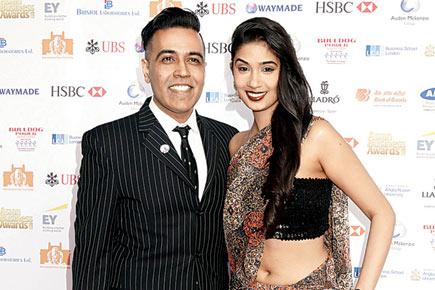
So what does the Indian business community in the UK think of Narendra Modi as the next possible Prime Minister (PM) of India? In the large and prosperous Gujarati community in Harrow, Wembley and Brent in London, there is, frankly, delight at the prospect of “having our own Gujju PM”. However, it would be wrong to characterise all Indian tycoons in Britain as signed up members of the BJP. But rather like the British government, the billionaire boys will be pragmatic and do business with whoever occupies the gaddi in Delhi. On behalf of the Hindujas, who have once again come out top among “Britain’s 101 Wealthiest Asians”, with a fortune estimated at £13.5 billion, Gopi Hinduja said: “We are hoping for a stable government. If a stable government comes, from 2016 our (India’s) economy will be booming like before.”
ADVERTISEMENT
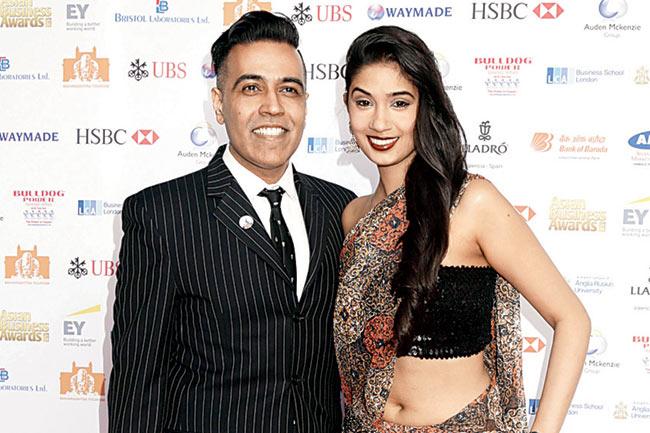
Here they are: Sunny & Shay Grewal (right) arriving at the Asian Business Awards annual Asian Rich List 101. PIC/ Yui Mok/PA Wire
Rise
The latest annual list of the richest Asians, mostly Indian with a sprinkling of Pakistanis, shows the number of billionaires has risen from seven in 2013 to nine this year. Those already in this club included: Srichand and Gopichand Hinduja (£13.5 billion); Lakshmi Mittal of ArcelorMittal (£12 billion); Anil Agarwal of Vedanta Resources (£2.4 billion); Ranjit and Baljinder Boparan Singh of Boparan Holdings (£1.35 billion); Simon, Bobby and Robin Arora of B&M Retail (£1.3 billion); Jasminder Singh of Radisson Blu Edwardian Hotels (£1.2 billion); and Sir Anwar Pervez of Bestway (Holdings (£1.1 billion).
The lone Pakistani in the group, Sir Anwar Pervez, 79, worked on the buses when he came to Britain in 1956 as a 21-year-old. He managed to send two of his sons to Eton College (which has educated David Cameron as well as Princes William and Harry). He would like to export much more cement to India from his factories in Pakistan and sees increased trade as a way of improving India-Pakistan relations.
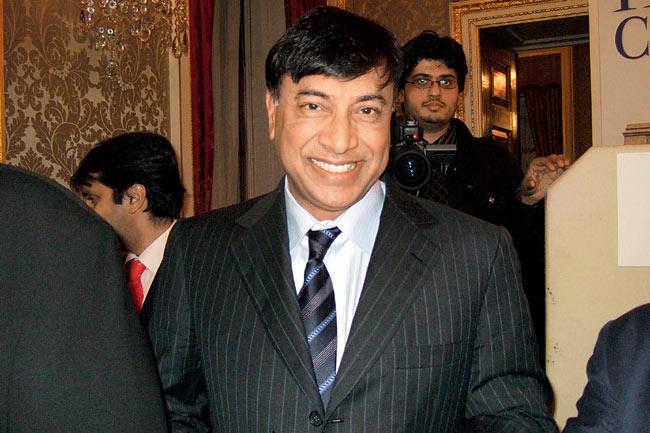
Mittal Mettle: Lakshmi Mittal, the steel tycoon
New
A brand new entry is that of Lakshmi Mittal’s brother-in-law, Sri Prakash Lohia, 61, chairman of Indorama, who has been valued at £2 billion. Lohia’s polyester-making plants are in Indonesia and elsewhere but he is spending more and more time in London where he has bought a Mayfair mansion. The Chandaria family have also been revalued at £1 billion so they, too, join the billionaire boys.
The list compiled by the Asian Media and Marketing Group shows that the total net worth of the 101 wealthiest Asians in the UK has gone up over the past 12 months from £45,598,000 to £51,730,000 — an increase of £6,132,000, amounting to 13.5 per cent. Far from being a burden on the economy, Indians, who have become essentially middle class, provide hundreds of thousands of jobs for British people. Investment from India helps.
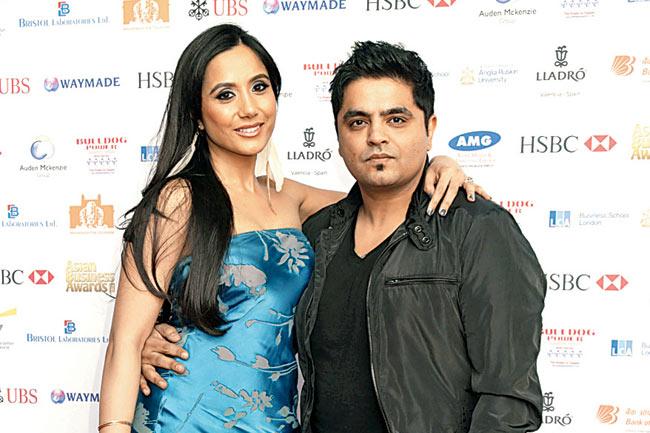
Glam Touch: Manrina Rekhi and Rishpal Singh Rekhi, better known by his stage name Rishi Rich. PIC/ Yui Mok/PA Wire
Powerful
At a gala dinner attended by 800 of the movers and shakers of the Asian community in Britain, the Rich List was officially released by the education secretary Michael Gove. He knows that in next year’s general election in the UK, the Asian vote will be critically important in some 40 marginal seats. In a tight fight, Asian voters could decide whether Labour’s Ed Miliband replaces David Cameron.
Gujarat
This is a landmark year for the Hindujas, being the centenary of the founding of the business by Parmanand Deepchand Hinduja in 1914. That was the year he moved at the age of 13 from Shikarpur, his birthplace in Sindh, to Bombay, which he was clever enough to see would become India’s commercial hub. Lord Swraj Paul (10th on the list with £750 million), the 83-year-old chairman of the steel empire which has 32 factories in India, has just returned from a 10-day trip to Delhi.
When Mamata Banerjee blocked Ratan Tata’s Nano project in Singur in West Bengal, Lord Paul also had to follow Tata to Gujarat and relocate Caparo’s automobile parts factory in Modi country. Lord Paul has visited Gujarat only once but his experience has been “very good. You don’t hear of any problems or complaints from your people in running the Gujarat plants.”
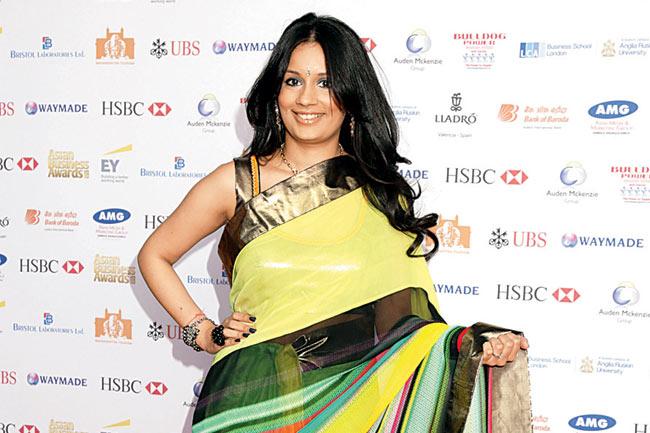
News and Views: Newsreader Sonali Shah arriving at the Asian Business Awards annual Asian Rich List 101, at Westminster Park Plaza, London. PIC/Yui Mok/PA Wire
Change
Did he subscribe to the opinion held by some captains of industry that a Modi prime ministership would be good for the Indian economy? “If you go by the Gujarat experiment I have no other choice but to agree,” replied Lord Paul. “Gujarat is the plant where we have had no complaints, no unhappiness; the rest time will tell. But a change is good for any country.”
He reckons President Pranab Mukherjee will be kept busy after the elections results are declared. He fervently hopes there will be “a new and fairer relationship between India and the NRI (Non Resident Indian) population round the world. India must give greater respect to NRIs — they are very much part of India. They are often treated just as ‘cash cows’. But whenever there is a financial crisis the country goes to NRIs — last time $65 billion flooded in as a result of an appeal for help. Meanwhile, people in India were trying to take out their money. So who has more faith in India — NRIs or people in India?”
Economy
If the economy in India does pick up, more Indians will travel to London and perhaps stay at the May Fair, the luxurious flagship of the 14-strong Radisson Blu Edwardian Hotels, whose chairman is 63-year-old Jasminder Singh. He is building a new hotel in London’s Leicester Square as part of a “half a billion dollar project.” As a “global citizen”, he gives high marks to the old wing of the Taj in Mumbai (“fabulous”) and the Imperial in Delhi (“exceptional”) but says that even the best hotels in India are outclassed by those in Thailand, a country which “does it better, both for price point and product”.
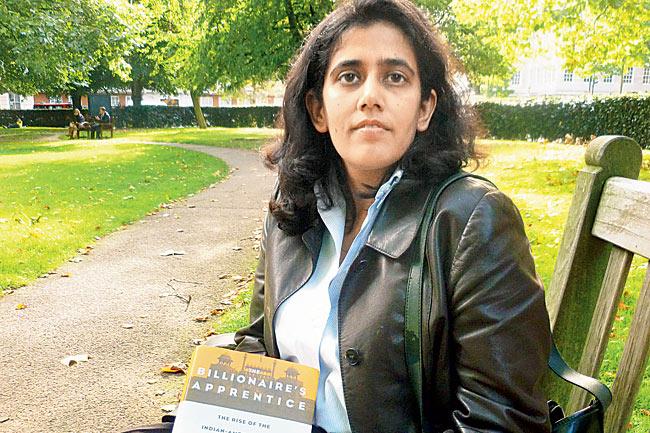
Write turn: Anita Raghavan
Mumbai
Alas, Mumbai Port gets very poor marks from Rami Ranger, 66, who is 48th with £135 million and has won the “Queen’s award for enterprise in international trade” five years running. His freight company, Sea, Air and Land, despatches goods to 112 countries. But sending consignments to India, where clearing is delayed by bureaucracy and inefficiency in ports, is about the one issue which makes Ranger really angry. “Mumbai is the worst,” he alleged.
Ranger’s entertaining autobiography, From Nothing to Everything: An inspiring saga of struggle and success from £2 to a £200 million business, reveals that when Ranger first came to Britain from Punjab in 1971, he began by cleaning cars and could not even afford a bicycle. “Now, I have a Rolls-Royce,” said Ranger, though he uses a Mercedes for everyday travelling.
“I use the Rolls-Royce to show off,” he grinned engagingly.
Brotherhood
Today, Indian entrepreneurs appear to be forming almost a brotherhood of billionaires across national boundaries. In the United States, venture capitalists and IT investors lead the field — Bharat Desai (net worth $2 billion), chairman and co-founder of Syntel; Romesh Wadhwani ($1.9 billion), founder and chairman of Symphony Technology; Kavitark Ram Shriram ($1.6 billion), Google board member and shareholder; Manoj Bhargava ($1.5 billion), founder and CEO of the popular energy drink brand “5-hour energy”; and Vinod Khosla, ($1.4 billion), partner at Khosla Ventures.
Rich
The rich comprise more of a mixed bag in India, according to figures from Forbes — Mukesh Ambani ($21 billion), chairman, Reliance Industries; Azim Premji ($13.8 billion), chairman of Wipro; Shiv Nadar ($8.6 billion), co-founder, HCL Technologies; Kumar Birla ($7.6 billion), inherited the Aditya Birla group; Sunil Mittal Bharti ($6.6 billion), of Airtel; Anil Ambani ($6.2 billion); Kushal Pal Singh ($3.4 billion), of DLF; Rahul Bajaj ($3.1 billion) motorcycles; N R Narayana Murthy ($1.6 billion) founder of Infosys; and Nandan Nilekani ($1.3 billion), co-founder, Infosys, and would be Congress MP.
Analysis
In Africa, people of Indian origin are among the 50 richest people — for example, Vimal Shah ($1.6 billion), CEO of Bidco Oil Refineries; and Sudhir Ruparelia ($1.1 billion), chairman of a Ugandan property and banking conglomerate. One woman who has compared the Indian rich in the UK and the US is Anita Raghavan, author of The Billionaire’s Apprentice: The Rise of the Indian-American Elite and the Fall of the Galleon Hedge Fund. Having gone to school at Cheltenham Ladies’ College in England, Raghavan went to university in America, first at Pennsylvania, then at Columbia. Afterwards, she became a journalist, working for the Wall Street Journal for 18 “fantastic” years and then for Forbes. Since 1999, she has been living in London, writing business stories for the New York Times. “I would have gone to university in the UK but my father decided I had become too English and strongly suggested I do university in the States,” recalled Raghavan. “I am actually glad I went to the States. America, more than any other country, is about meritocracy and I don’t think the UK is the same way.” She finds the pace of life in Britain more to her taste, though: “What a glorious place to live — there is green. There is a wonderful gentleness. I choose to live here; I don’t choose to work here.”
Question
There is a story about an Indian woman tycoon who was invited by David Cameron to tea at 10, Downing Street. “Instead of going to America you should have come to Britain,” he said. The woman smiled and said: “In that case, it’s highly unlikely I would have been invited here.” The big question in London is whether Cameron will have to welcome the next Indian Prime Minister to his house with the greeting: Kem cho.
 Subscribe today by clicking the link and stay updated with the latest news!" Click here!
Subscribe today by clicking the link and stay updated with the latest news!" Click here!







